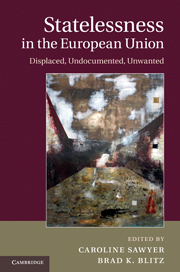Book contents
- Frontmatter
- Contents
- List of contributors
- List of cases
- List of conventions, covenants and treaties
- Acknowledgements
- List of abbreviations and acronyms
- PART I The issue
- 1 Statelessness in the European Union
- 2 Stateless people and undocumented migrants: an Arendtian perspective
- 3 The rights of non-citizens to membership
- 4 Stateless in Europe: legal aspects of de jure and de facto statelessness in the European Union
- 5 Policy responses and global discourses on the rights of non-citizens and stateless people
- PART II The research project
- 12 Conclusions
- Bibliography
- Index
- References
2 - Stateless people and undocumented migrants: an Arendtian perspective
from PART I - The issue
Published online by Cambridge University Press: 17 February 2011
- Frontmatter
- Contents
- List of contributors
- List of cases
- List of conventions, covenants and treaties
- Acknowledgements
- List of abbreviations and acronyms
- PART I The issue
- 1 Statelessness in the European Union
- 2 Stateless people and undocumented migrants: an Arendtian perspective
- 3 The rights of non-citizens to membership
- 4 Stateless in Europe: legal aspects of de jure and de facto statelessness in the European Union
- 5 Policy responses and global discourses on the rights of non-citizens and stateless people
- PART II The research project
- 12 Conclusions
- Bibliography
- Index
- References
Summary
Perhaps more than ever before, we live in a situation in which, as Hannah Arendt put it in her 1943 article, ‘We Refugees’, ‘passports or birth certificates, and sometimes even income tax receipts, are no longer formal papers but matters of social distinction’. In what constituted a drastic shift in policy, many Western governments curtailed legal means of entry and residence for foreigners from the mid-1970s onward. States stopped admitting economic migrants. The signatory states of the Schengen Agreement (1985) and the TREVI group (1957) pushed asylum policies towards the lowest common denominator on a European level. Following the fall of the Berlin Wall, measures like the third-country rule, the introduction of visa requirements for refugee-producing countries and the extension of the policing of borders have made it almost impossible to claim or obtain political asylum in the European Union.
These measures have not been able to stop immigration. They have, however, illegalised work migration and driven many potential asylum seekers underground. Many foreigners already living on the territory found themselves, in different ways and to different degrees, illegalised. These people include rejected asylum seekers, visa overstayers and immigrants whose residence permit has not been renewed for a variety of reasons, such as losing employment, growing dependent on welfare benefits, or having committed a crime, including having violated foreigner-specific restrictions.
- Type
- Chapter
- Information
- Statelessness in the European UnionDisplaced, Undocumented, Unwanted, pp. 22 - 40Publisher: Cambridge University PressPrint publication year: 2011
References
- 7
- Cited by



